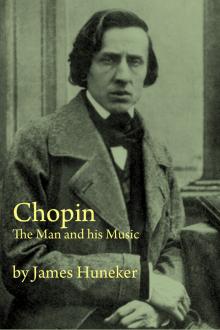Chopin: The Man and His Music, James Huneker [free e books to read online txt] 📗

- Author: James Huneker
- Performer: -
Book online «Chopin: The Man and His Music, James Huneker [free e books to read online txt] 📗». Author James Huneker
Miss Stirling was doubtless in love with him and Princess Czartoryska followed him to Scotland to see if his health was better. So he was not altogether deserted by the women—indeed he could not live without their little flatteries and agreeable attentions. It is safe to say that a woman was always within call of Chopin.
He played at Manchester on the 28th of August, but his friend Mr.
Osborne, who was present, says “his playing was too delicate to create enthusiasm and I felt truly sorry for him.” On his return to Scotland he stayed with Mr. and Mrs. Salis Schwabe.
Mr. J. Cuthbert Hadden wrote several years ago in the Glasgow “Herald”
of Chopin’s visit to Scotland in 1848. The tone-poet was in the poorest health, but with characteristic tenacity played at concerts and paid visits to his admirers. Mr. Hadden found the following notice in the back files of the Glasgow “Courier”:
Monsieur Chopin has the honour to announce that his matinee musicale will take place on Wednesday, the 27th September, in the Merchant Hall, Glasgow. To commence at half-past two o’clock. Tickets, limited in number, half-a-guinea each, and full particulars to be had from Mr. Muir Wood, 42, Buchanan street.
He continues:
The net profits of this concert are said to have been exactly L60—a ridiculously low sum when we compare it with the earnings of later day virtuosi; nay, still more ridiculously low when we recall the circumstance that for two concerts in Glasgow sixteen years before this Paganini had L 1,400. Muir Wood, who has since died, said: “I was then a comparative stranger in Glasgow, but I was told that so many private carriages had never been seen at any concert in the town. In fact, it was the county people who turned out, with a few of the elite of Glasgow society. Being a morning concert, the citizens were busy otherwise, and half a guinea was considered too high a sum for their wives and daughters.”
The late Dr. James Hedderwick, of Glasgow, tells in his reminiscences that on entering the hall he found it about one-third full. It was obvious that a number of the audience were personal friends of Chopin. Dr. Hedderwick recognized the composer at once as “a little, fragile-looking man, in pale gray suit, including frock coat of identical tint and texture, moving about among the company, conversing with different groups, and occasionally consulting his watch,” which seemed to be “no bigger than an agate stone on the forefinger of an alderman.” Whiskerless, beardless, fair of hair, and pale and thin of face, his appearance was “interesting and conspicuous,” and when, “after a final glance at his miniature horologe, he ascended the platform and placed himself at the instrument, he at once commanded attention.” Dr. Hedderwick says it was a drawing-room entertainment, more piano than forte, though not without occasional episodes of both strength and grandeur. It was perfectly clear to him that Chopin was marked for an early grave.
So far as can be ascertained, there are now living only two members of that Glasgow audience of 1848. One of the two is Julius Seligmann, the veteran president of the Glasgow Society of Musicians, who, in response to some inquiries on the subject, writes as follows:
“Several weeks before the concert Chopin lived with different friends or pupils on their invitations, in the surrounding counties. I think his pupil Miss Jane Stirling had something to do with all the general arrangements. Muir Wood managed the special arrangements of the concert, and I distinctly remember him telling me that he never had so much difficulty in arranging a concert as on this occasion. Chopin constantly changed his mind. Wood had to visit him several times at the house of Admiral Napier, at Milliken Park, near Johnstone, but scarcely had he returned to Glasgow when he was summoned back to alter something. The concert was given in the Merchant Hall, Hutcheson street, now the County Buildings. The hall was about three-quarters filled. Between Chopin’s playing Madame Adelasio de Margueritte, daughter of a well-known London physician, sang, and Mr. Muir accompanied her. Chopin was evidently very ill. His touch was very feeble, and while the finish, grace, elegance and delicacy of his performances were greatly admired by the audience, the want of power made his playing somewhat monotonous. I do not remember the whole programme, but he was encored for his well-known mazurka in B
flat (op. 7, No. 1), which he repeated with quite different nuances from those of the first time. The audience was very aristocratic, consisting mostly of ladies, among whom were the then Duchess of Argyll and her sister, Lady Blantyre.”
The other survivor is George Russell Alexander, son of the proprietor of the Theatre Royal, Dunlop street, who in a letter to the writer remarks especially upon Chopin’s pale, cadaverous appearance. “My emotion,” he says, “was so great that two or three times I was compelled to retire from the room to recover myself. I have heard all the best and most celebrated stars of the musical firmament, but never one has left such an impress on my mind.”
Chopin played October 4 in Edinburgh, and returned to London in November after various visits. We read of a Polish ball and concert at which he played, but the affair was not a success. He left England in January 1849 and heartily glad he was to go. “Do you see the cattle in this meadow?” he asked, en route for Paris: “Ca a plus d’intelligence que des Anglais,” which was not nice of him. Perhaps M. Niedzwiecki, to whom he made the remark took as earnest a pure bit of nonsense, and perhaps—! He certainly disliked England and the English.
Now the curtain prepares to fall on the last dreary finale of Chopin’s life, a life not for a moment heroic, yet lived according to his lights and free from the sordid and the soil of vulgarity. Jules Janin said: “He lived ten miraculous years with a breath ready to fly away,” and we know that his servant Daniel had always to carry him to bed. For ten years he had suffered from so much illness that a relapse was not noticed by the world. His very death was at first received with incredulity, for, as Stephen Heller said, he had been reported dead so often that the real news was doubted. In 1847 his legs began to bother him by swelling, and M. Mathias described him as “a painful spectacle, the picture of exhaustion, the back bent, head bowed—but always amiable and full of distinction.” His purse was empty, and his lodgings in the Rue Chaillot were represented to the proud man as being just half their cost,—the balance being paid by the Countess Obreskoff, a Russian lady. Like a romance is the sending, by Miss Stirling, of twenty-five thousand francs, but it is nevertheless true. The noble-hearted Scotchwoman heard of Chopin’s needs through Madame Rubio, a pupil, and the money was raised. That packet containing it was mislaid or lost by the portress of Chopin’s house, but found after the woman had been taxed with keeping it.
Chopin, his future assured, moved to Place Vendome, No. 12. There he died. His sister Louise was sent for, and came from Poland to Paris. In the early days of October he could no longer sit upright without support. Gutmann and the Countess Delphine Potocka, his sister, and M.
Gavard, were constantly with him. It was Turgenev who spoke of the half hundred countesses in Europe who claimed to have held the dying Chopin in their arms. In reality he died in Gutmann’s, raising that pupil’s hand to his mouth and murmuring “cher ami” as he expired. Solange Sand was there, but not her mother, who called and was not admitted—so they say. Gutmann denies having refused her admittance. On the other hand, if she had called, Chopin’s friends would have kept her away from him, from the man who told Franchomme two days before his death, “She said to me that I would die in no arms but hers.” Surely—unless she was monstrous in her egotism, and she was not—George Sand did not hear this sad speech without tears and boundless regrets. Alas! all things come too late for those who wait.
Tarnowski relates that Chopin gave his last orders in perfect consciousness. He begged his sister to burn all his inferior compositions. “I owe it to the public,” he said, “and to myself to publish only good things. I kept to this resolution all my life; I wish to keep to it now.” This wish has not been respected. The posthumous publications are for the most part feeble stuff.
Chopin died, October 17, 1849, between three and four in the morning, after having been shrived by the Abbe Jelowicki. His last word, according to Gavard, was “Plus,” on being asked if he suffered.
Regarding the touching and slightly melodramatic death bed scene on the day previous, when Delphine Potocka sang Stradella and Mozart—or was it Marcello?—Liszt, Karasowski, and Gutmann disagree.
The following authentic account of the last hours of Chopin appears here for the first time in English, translated by Mr. Hugh Craig. In Liszt’s well-known work on Chopin, second edition, 1879, mention is made of a conversation that he had held with the Abbe Jelowicki respecting Chopin’s death; and in Niecks’ biography of Chopin some sentences from letters by the Abbe are quoted. These letters, written in French, have been translated and published in the “Allgemeine Musik Zeitung,” to which they were given by the Princess Marie Hohenlohe, the daughter of Princess Caroline Sayn Wittgenstein, Liszt’s universal legatee and executor, who died in 1887.
For many years [so runs the document] the life of Chopin was but a breath. His frail, weak body was visibly unfitted for the strength and force of his genius. It was a wonder how in such a weak state, he could live at all, and occasionally act with the greatest energy. His body was almost diaphanous; his eyes were almost shadowed by a cloud from which, from time to time, the lightnings of his glance flashed. Gentle, kind, bubbling with humor, and every way charming, he seemed no longer to belong to earth, while, unfortunately, he had not yet thought of heaven. He had good friends, but many bad friends. These bad friends were his flatterers, that is, his enemies, men and women without principles, or rather with bad principles. Even his unrivalled success, so much more subtle and thus so much more stimulating than that of all other artists, carried the war into his soul and checked the expression of faith and of prayer. The teachings of the fondest, most pious mother became to him a recollection of his childhood’s love. In the place of faith, doubt had stepped in, and only that decency innate in every generous heart hindered him from indulging in sarcasm and mockery over holy things and the consolations of religion.
While he was in this spiritual condition he was attacked by the pulmonary disease that was soon to carry him away from us.
The knowledge of this cruel sickness reached me on my return from Rome. With beating heart I hurried to him, to see once more the friend of my youth, whose soul was infinitely dearer to me than





Comments (0)